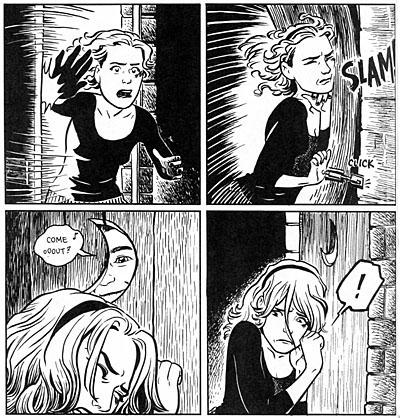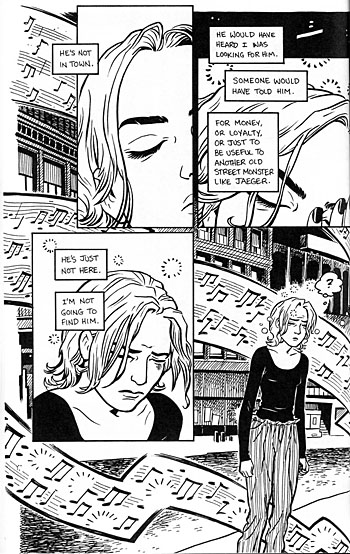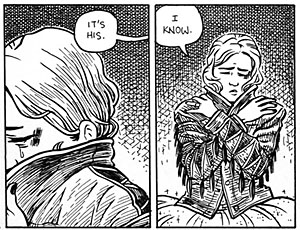 By Carla Speed McNeil
By Carla Speed McNeil
216 pages, black and white
Published by Dark Horse
Oh Finder, how I’ve missed you. It’s been a few years, but Carla Speed McNeil’s Eisner Award-winning series is back, with a brand-new graphic novel as well as a brand-new publisher (Dark Horse Comics). This is actually the second indy comic darling that they’ve picked up in the last year or two, the other being Larry Marder’s Beanworld. Like Beanworld, Dark Horse is both reprinting the previous run of Finder (in two big collections) as well as bringing us new books. And in typical Finder tradition, McNeil has avoided an easy path when it comes to Finder: Voice.
 Finder: Voice takes place in McNeil’s city-state of Anvard, a curious mix of past traditions and future technology. It’s a little hard at times to fully explain Anvard, with its multiple clans, regions of partial or total darkness, and the ever-growing feeling that this is a city full of people desperately trying to ignore the decay that is accelerating in the background. And while Finder: Voice wasn’t intended to be a brand-new opening to the series (it was serialized for some time online on McNeil’s website before Dark Horse announced acquiring the series), I found myself surprised at how much McNeil does in the way of introducing both old and new readers to her setting. Finder: Voice follows former supporting character Rachel Grosvenor as she fights for full membership to the Llaverac clan. Success means a place for her and, indirectly, her siblings within Anvard’s society. Failure means a subservient and grim future at best. But quickly, McNeil uproots Rachel’s life, taking a path promising to be in the upper tiers of Anvard society and shoving her into a desperate quest in its bottom dregs.
Finder: Voice takes place in McNeil’s city-state of Anvard, a curious mix of past traditions and future technology. It’s a little hard at times to fully explain Anvard, with its multiple clans, regions of partial or total darkness, and the ever-growing feeling that this is a city full of people desperately trying to ignore the decay that is accelerating in the background. And while Finder: Voice wasn’t intended to be a brand-new opening to the series (it was serialized for some time online on McNeil’s website before Dark Horse announced acquiring the series), I found myself surprised at how much McNeil does in the way of introducing both old and new readers to her setting. Finder: Voice follows former supporting character Rachel Grosvenor as she fights for full membership to the Llaverac clan. Success means a place for her and, indirectly, her siblings within Anvard’s society. Failure means a subservient and grim future at best. But quickly, McNeil uproots Rachel’s life, taking a path promising to be in the upper tiers of Anvard society and shoving her into a desperate quest in its bottom dregs.
Those who are familiar with Finder in general will note that its main character, Jaeger, is missing in the above description. He’s a critical figure within Finder: Voice, as Rachel tries to locate Jaeger so that he can use his Finder skills to retrieve a crucially important artifact for Rachel. But here, the quest isn’t Jaeger’s to find a ring, but rather Rachel’s to do the impossible: find a Finder who doesn’t wish to be found. What would be relatively simple for Jaeger, navigating the outskirts of society and moving among those who were discarded and ignored, is a dangerous and near-impossible task for Rachel. That’s part of what makes Finder: Voice so enjoyable; while her attempt to gain clan membership is supposed to be her rite of passage into adulthood, it’s her search for Jaeger that is her true journey into becoming an adult in her own right. Rachel starts as a pawn and victim, but eventually claws her way up and through, finding her own voice in a world where to be a member of a clan is to fit in with everyone else, and to be outside the clan is to be a non-entity.
 One of the things that works better than I thought it would with Finder: Voice as an introduction to the series in general is that by having Rachel as the central protagonist, characters that we might have met before (such as Chief Coward, or Brom) are new to her. She’s not relying on Jaeger’s previous encounters, and as a result new readers are as much in the dark as Rachel. McNeil still does her best to explain these new situations and concepts to readers new and old, of course. Having the Llaverac clan competition open Finder: Voice works well for that early exposition, explaining not only clan structure but also the physical characteristics of the Llaveracs, or how each clan operates differently than the ones around it. Beyond that, though, it’s an immersive process. From Rachel using her fingers as a "phone" to Marcie’s casual commenting on being in a "night neighborhood," the higher technology is intriguing and fascinating, and what is shown as second nature to the inhabitants of Anvard is new and fun to readers.
One of the things that works better than I thought it would with Finder: Voice as an introduction to the series in general is that by having Rachel as the central protagonist, characters that we might have met before (such as Chief Coward, or Brom) are new to her. She’s not relying on Jaeger’s previous encounters, and as a result new readers are as much in the dark as Rachel. McNeil still does her best to explain these new situations and concepts to readers new and old, of course. Having the Llaverac clan competition open Finder: Voice works well for that early exposition, explaining not only clan structure but also the physical characteristics of the Llaveracs, or how each clan operates differently than the ones around it. Beyond that, though, it’s an immersive process. From Rachel using her fingers as a "phone" to Marcie’s casual commenting on being in a "night neighborhood," the higher technology is intriguing and fascinating, and what is shown as second nature to the inhabitants of Anvard is new and fun to readers.
Part of what makes Finder in general such an immersive experience is McNeil’s art, which is packed full of detail and expression. Strictly in terms of portraits, the art is a winner; Rachel hits all points throughout this book, from bravely looking forward to terrified glances over her shoulder. Moments as simple as a smiling man forever following Rachel carry a great deal of menace under McNeil’s pen; even the minor characters get a great amount of detail here. And the backgrounds are great, from pop-up ads infesting television screens, to dancing musical notes outside clubs and inside Ascian dwellings. It’s the echoes that move throughout the book that I found myself entranced with the most, an image of a ghostly memory of Jaeger hugging Rachel at her low point is powerful early on, but seeing it repeated near the end where it’s Rachel hugging herself while wearing Jaeger’s discarded jacket that you begin to realize that even in the art, the story is coming full circle and that Rachel is ready to stand on her own.
 Another aspect about Finder I’ve always enjoyed is that in the collected editions and graphic novels, McNeil has included a series of footnotes that act like a director’s commentary about the completed work. Over the years they’ve progressed from explaining what might not have come across as well as McNeil had wished, into an in-depth discussion of the world of Finder and additional anthropological tidbits about its setting. They’re not necessary to enjoy the story, but read as a postscript to the book, it’s an interesting detour into McNeil’s creation process and how it plays out.
Another aspect about Finder I’ve always enjoyed is that in the collected editions and graphic novels, McNeil has included a series of footnotes that act like a director’s commentary about the completed work. Over the years they’ve progressed from explaining what might not have come across as well as McNeil had wished, into an in-depth discussion of the world of Finder and additional anthropological tidbits about its setting. They’re not necessary to enjoy the story, but read as a postscript to the book, it’s an interesting detour into McNeil’s creation process and how it plays out.
Watching Rachel grow into someone in control of her surroundings (or at least as much as one can be in Anvard) is a real pleasure. The Rachel we meet in the opening pages of Finder: Voice is quite different from the one in its conclusion. She doesn’t make all the right decisions along the way, but her ability to learn from her mistakes and get to the end point she needs is part of what makes her an appealing main character. As someone who’s loved reading about Jaeger over the years, seeing Rachel take the central spotlight is ultimately thrilling. Based on glimpses on McNeil’s website, we’ll be seeing a lot more of Rachel in the stories to come. I’d say she’s proven herself worthy of the role of protagonist, here. Finder: Voice is a great way to start to learn about the strange world of Finder for yourself.
Purchase Links: Amazon.com | Powell’s Books
